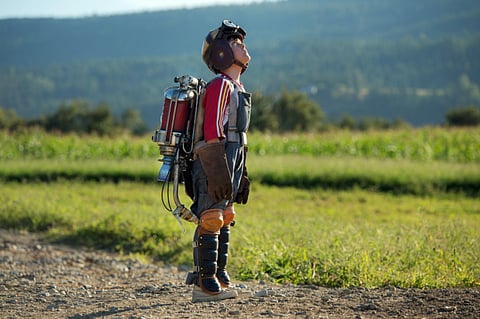Review: ‘Tomorrowland’ is enormous fun
George Clooney’s latest film hurtles through space, time, and other dimensions

It’s a brave family movie that invests in high-budget thrills without the safety-net of a franchise brand, mows down a small child with a pickup truck (it’s OK, she’s a robot), and subjects us to the sight of Hugh Laurie in black leather jodhpurs.
But bolder still is Tomorrowland’s sincere attempt to jump-start humanity’s technological optimism, which it reckons stalled with the decline of the space race with potentially planet-threatening consequences. Whether or not that’s the answer to the planet’s current problems, director Brad Bird deserves praise for packing such big ideas into such an accessible, rip-roaring, retro-futurist adventure.
What exactly Tomorrowland is, or even where it is, is difficult to explain. A prologue at the 1964 New York World’s Fair sees Frank, a boy-genius inventor who’ll grow up to be George Clooney, given a Tomorrowland badge by a mysterious little English girl. It grants him access to a VIP theme-park ride that whisks visitors to a secret world of the future, or a parallel present, or something. Anyway, Tomorrowland itself turns out to be a space-age utopia, full of slender glass skyscrapers and flying trains and citizens apparently dressed by fashion students. If it looks like an expensive airline commercial, there turns out to be a good reason for that.
But then we’re catapulted to the present day, where curious Nasa engineer’s daughter Casey (Britt Robertson, who could be Jennifer Lawrence’s younger sister) is constantly being told in class how doomed the Earth is, but never how to fix it. She, too, receives a Tomorrowland badge which, when she touches it, immediately zaps her to the same future city. Except she’s not really there: she’s just seeing it, like a giant hologram. Again, it’s difficult to explain — but delightful to watch. That’s pretty much the case throughout. As Clooney says to her at one point: “Do I have to explain everything to you? Can’t you just be amazed?”
The story proceeds at a brisk pace, the answers to the riddles always one step ahead and mysterious android baddies one step behind. Athena, the mysterious English girl, also turns out to be an android, and is therefore still a super-smart kid, 50 years on. Frank, on the other hand, has grown into an embittered, reclusive man-genius inventor. Once Casey pitches up at his stronghold, this ad-hoc family are pitched through a seamless succession of chases, shootouts and escapes, sending them hurtling through space, time and possibly other dimensions in everything from a bathtub to a steampunk rocket ship hidden inside the Eiffel Tower.
As he did with The Incredibles, director Brad Bird strikes a playful tone, revelling in retro references, novel gadgetry and the reckless momentum of the action. It’s great fun, at least until they finally arrive in Tomorrowland and face Laurie and his leather jodhpurs. Judging by his penchant for monologuing, Laurie hasn’t watched The Incredibles, though his big “humanity’s got a problem” speech is actually pretty spot-on.
There’s a touch of Mr Incredible to Clooney’s character, too: a grouchy surrogate dad whose resignation is overturned by youthful enthusiasm. The relationships are less straightforward, though. Athena was Frank’s childhood crush but now she could be his grand-daughter, and he never quite got over discovering she was a robot. That’s going to take some therapy. Casey, too, is refreshingly atypical: a resourceful, technically literate female character who’s neither a geek nor a token lust object out of a Transformers movie.
As well as The Incredibles, Tomorrowland contains traces of Elysium, Philip K Dick, Hayao Miyazaki, The Fifth Element and possibly Interstellar — which also identified the decline of Nasa as the beginning of the end. But when it comes down to it, Tomorrowland is very much a Disney movie, directed more at wide-eyed youngsters (and their parents) than pop-savvy teen audiences. It’s also named after a pre-existing area of Disney’s theme parks, which technically makes it a shrewd piece of product placement, like Pirates of the Caribbean.
It’s unlikely Tomorrowland will launch another smash-hit franchise like Pirates — it’s a little too wholesome for that. But it would be uncharitable to dismiss a family movie that’s genuinely trying to save the world. Tomorrowland deals with threats far closer to the real world than, say, rogue superheroes or alien robots. It understands that utopia and dystopia are two sides of the same coin, and it’s unafraid to ask big questions about what we want the future to look like and what we’re prepared to do about it. That’s about as fashionable as leather jodhpurs; but if its diagnosis of what’s wrong with the world is ultimately simplistic and rather hokey, there’s still some truth to it.
Sign up for the Daily Briefing
Get the latest news and updates straight to your inbox


